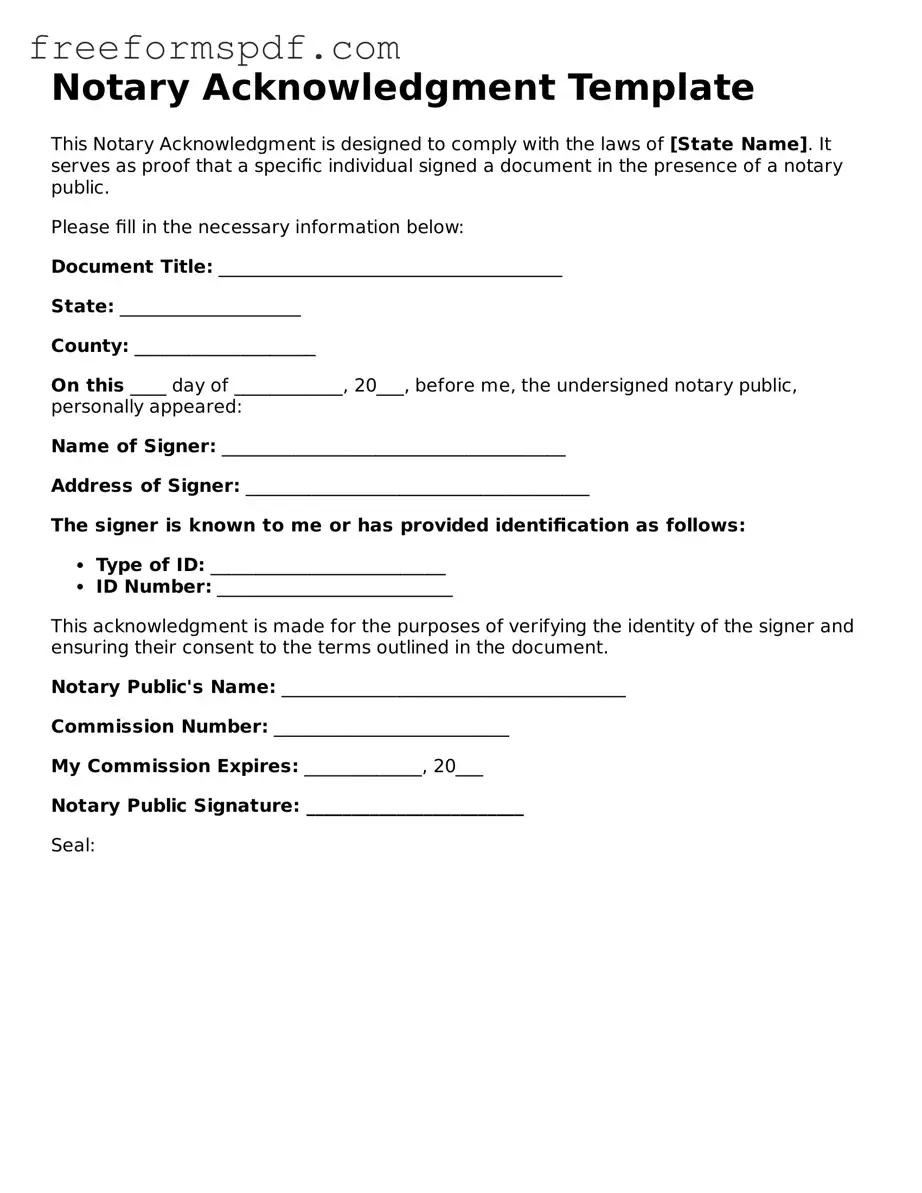Notary Acknowledgement Document
Notary Acknowledgement - Customized for Each State
Common mistakes
-
Incorrect Name Entry: Many individuals fail to write their names exactly as they appear on their identification. This can lead to issues with the validity of the notarization.
-
Missing Date: Some people forget to include the date of the acknowledgment. Without this, the document may not be considered valid or enforceable.
-
Improper Signature: Signatures must match the name provided in the form. If the signer uses a different name or a nickname, it can create confusion and invalidate the acknowledgment.
-
Failure to Complete the Jurat: The jurat section must be filled out properly. This includes confirming that the signer is present and aware of the document's contents. Omitting this information can lead to legal challenges.
Learn More on This Form
-
What is a Notary Acknowledgment form?
A Notary Acknowledgment form is a document that verifies the identity of a person signing a document. It confirms that the signer appeared before a notary public and acknowledged that they signed the document voluntarily. This form is often used in legal and financial transactions.
-
When is a Notary Acknowledgment form needed?
A Notary Acknowledgment is typically required when a document needs to be recorded or filed with a government agency. Common examples include property deeds, powers of attorney, and mortgage documents. It helps ensure the authenticity of the signatures on these important documents.
-
How do I complete a Notary Acknowledgment form?
To complete a Notary Acknowledgment form, follow these steps:
- Fill in the name of the person signing the document.
- Provide the date when the acknowledgment is being made.
- Include the name of the notary public who will be witnessing the signature.
- Sign the form in front of the notary public.
After signing, the notary will fill out their section, which includes their signature, seal, and other required information.
-
What should I bring to a notary appointment?
When visiting a notary, it is important to bring a valid form of identification. Acceptable IDs typically include a driver’s license, passport, or state-issued ID. Ensure that the document you need to sign is also with you.
-
Is there a fee for notarization?
Yes, notaries often charge a fee for their services. The amount can vary based on state regulations and the type of document being notarized. It is advisable to ask about the fee before your appointment.
-
Can a Notary Acknowledgment form be used in all states?
While Notary Acknowledgment forms are widely used across the United States, the specific requirements and wording can differ by state. It is important to check the regulations in your state to ensure compliance.
Misconceptions
Understanding the Notary Acknowledgement form is essential for anyone involved in legal documents. However, several misconceptions can lead to confusion. Below are eight common misunderstandings about this form.
-
Notaries can verify the content of documents.
Many believe that a notary can assess the truthfulness of the information in a document. In reality, a notary's role is to confirm the identity of the signer, not to evaluate the document's content.
-
All documents require a notary acknowledgment.
Not every document needs to be notarized. Acknowledgment is typically required for specific legal documents, such as deeds or powers of attorney, but not for all paperwork.
-
Notarization guarantees the legality of a document.
Some people think that notarization makes a document legally binding. While it adds a layer of authenticity, it does not ensure that the document is enforceable or valid under the law.
-
Notaries can provide legal advice.
Many individuals mistakenly believe that notaries can offer legal guidance. Notaries are not authorized to give legal advice and should not be relied upon for such information.
-
Notary services are free.
While some notaries may offer services at no charge, many charge a fee for their services. This fee can vary based on location and the type of document being notarized.
-
Identification is not necessary for notarization.
Some people assume that they can be notarized without providing identification. In fact, a notary must verify the identity of the signer through valid identification.
-
Notaries can notarize documents from any state.
Notaries are commissioned in specific states and can only notarize documents within that jurisdiction. A notarization performed in one state may not be valid in another.
-
Once notarized, a document cannot be changed.
It is a common misconception that a notarized document is set in stone. However, changes can be made, but they may require a new notarization to maintain authenticity.
Being aware of these misconceptions can help individuals navigate the process of notarization more effectively. Proper understanding ensures that documents are handled correctly and legally.
Popular Forms:
What Is a Testamentary Affidavit - A Self-Proving Affidavit improves the prospects of verified inheritance distribution.
Bill of Sale for Four Wheeler - Provides comfort in knowing all terms are written down and agreed upon.
The Nyc Apartment Registration Form is a vital resource for landlords and property managers in New York City, as it gathers essential details about the apartment and its owner. To ensure compliance with housing regulations and streamline the rental process, it's recommended to refer to templates like NY Templates, which can aid in the proper completion and submission of this necessary form, ultimately fostering transparency in rental agreements.
California Corrective Deed - This form rectifies errors in the original deed, ensuring legal accuracy.
